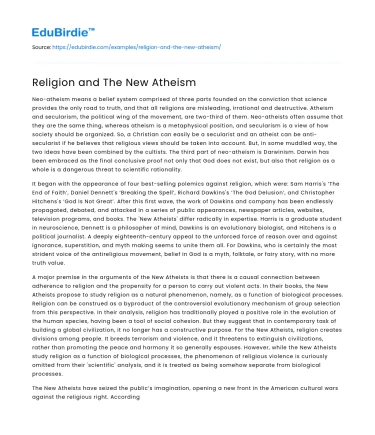Neo-atheism means a belief system comprised of three parts founded on the conviction that science provides the only road to truth, and that all religions are misleading, irrational and destructive. Atheism and secularism, the political wing of the movement, are two-third of them. Neo-atheists often assume that they are the same thing, whereas atheism is a metaphysical position, and secularism is a view of how society should be organized. So, a Christian can easily be a secularist and an atheist can be anti-secularist if he believes that religious views should be taken into account. But, in some muddled way, the two ideas have been combined by the cultists. The third part of neo-atheism is Darwinism. Darwin has been embraced as the final conclusive proof not only that God does not exist, but also that religion as a whole is a dangerous threat to scientific rationality.
It began with the appearance of four best-selling polemics against religion, which were: Sam Harris's ‘The End of Faith’, Daniel Dennett's ‘Breaking the Spell’, Richard Dawkins's ‘The God Delusion’, and Christopher Hitchens's ‘God Is Not Great’. After this first wave, the work of Dawkins and company has been endlessly propagated, debated, and attacked in a series of public appearances, newspaper articles, websites, television programs, and books. The 'New Atheists' differ radically in expertise. Harris is a graduate student in neuroscience, Dennett is a philosopher of mind, Dawkins is an evolutionary biologist, and Hitchens is a political journalist. A deeply eighteenth-century appeal to the unforced force of reason over and against ignorance, superstition, and myth making seems to unite them all. For Dawkins, who is certainly the most strident voice of the antireligious movement, belief in God is a myth, folktale, or fairy story, with no more truth value.
Save your time!
We can take care of your essay
- Proper editing and formatting
- Free revision, title page, and bibliography
- Flexible prices and money-back guarantee
A major premise in the arguments of the New Atheists is that there is a causal connection between adherence to religion and the propensity for a person to carry out violent acts. In their books, the New Atheists propose to study religion as a natural phenomenon, namely, as a function of biological processes. Religion can be construed as a byproduct of the controversial evolutionary mechanism of group selection from this perspective. In their analysis, religion has traditionally played a positive role in the evolution of the human species, having been a tool of social cohesion. But they suggest that in contemporary task of building a global civilization, it no longer has a constructive purpose. For the New Atheists, religion creates divisions among people. It breeds terrorism and violence, and it threatens to extinguish civilizations, rather than promoting the peace and harmony it so generally espouses. However, while the New Atheists study religion as a function of biological processes, the phenomenon of religious violence is curiously omitted from their 'scientific' analysis, and it is treated as being somehow separate from biological processes.
The New Atheists have seized the public’s imagination, opening a new front in the American cultural wars against the religious right. According to Simone Weil’s powerful observation, atheism is a “purification of the notion of God”. It’s called ‘profane holiness’. Conventional true believers who chop the broad landscape of spirituality into fixed, little denominational plots, ringed with sectarian ‘No Trespassing’ signs, lead us to wrong turns. Thus, the New Atheism should be celebrated, not scorned. It is a kind of neo-Socratic midwifery, which, contrary to its own explicit intentions, frees true religious-spiritual energy from the old divisions, prejudices, and clichés of the past. Religion is then open to be returned to its original subversive and dynamic, not static, role. The New Atheism ironically offers a kind of implicit defense, as well as enabler, of the religious life and mind. Of course, its goal is to expose spirituality and religion as the great delusions of history, but paradoxically the result is the opposite.






 Stuck on your essay?
Stuck on your essay?

